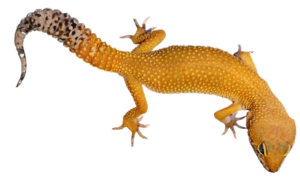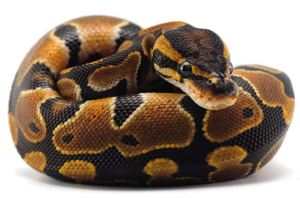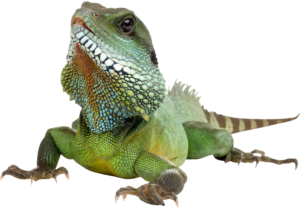Reptiles make fantastic pets, offering a unique and low-maintenance companionship. But not all reptiles are created equal, especially for beginners. If you’re new to the world of reptilian companionship, you’ll want to choose a pet that’s easy to care for and fits seamlessly into your lifestyle. Here’s our list of the top 10 best reptile pets for beginners, ensuring you’ll find the perfect match for your household.
Contents
- Top 10 Best Reptile Pets for Beginners
- 1. Leopard Geckos: The Popular Choice
- 2. Ball Pythons: Gentle Giants
- 3. Bearded Dragons: Vibrant Companions
- 4. Crested Geckos: Arboreal Wonders
- 5. Turtles: Timeless Aquatic Companions
- 6. Corn Snakes: Small, Colorful, and Docile
- 7. Fire-Bellied Toads: Charming Companions
- 8. Tortoises: Gentle Herbivores
- 9. Water Dragons: Enjoyable and Manageable
- 10. Chameleons: Masters of Camouflage
- Things to Keep in Mind When Choosing a Reptile Pet
- Conclusion
- FAQs
If you’re fascinated by the captivating world of reptiles, you’ve come to the right place. Reptiles have long captivated human imagination, and for good reason. These fascinating creatures offer a unique blend of grace, adaptability, and diversity, making them ideal companions for those seeking an enriching and rewarding pet-keeping experience.
As a beginner, you might be overwhelmed by the sheer array of reptile species available. But fear not! We’ve compiled a comprehensive list of the top 10 best reptile pets for beginners, ensuring you find the perfect fit for your lifestyle and personality.
Top 10 Best Reptile Pets for Beginners
1. Leopard Geckos: The Popular Choice
 Leopard geckos (Eublepharis macularius) have quickly become the most popular reptile pets, and for good reason. These docile and relatively low-maintenance geckos are known for their striking patterns and easygoing temperament. They thrive in relatively simple enclosures and require minimal handling, making them an ideal choice for busy individuals.
Leopard geckos (Eublepharis macularius) have quickly become the most popular reptile pets, and for good reason. These docile and relatively low-maintenance geckos are known for their striking patterns and easygoing temperament. They thrive in relatively simple enclosures and require minimal handling, making them an ideal choice for busy individuals.
2. Ball Pythons: Gentle Giants
 Ball pythons (Python regius) are another popular choice for beginners due to their calm and gentle nature. These non-venomous snakes are known for their predictable behavior and relatively docile temperament. They require a bit more space than leopard geckos, but their care requirements are still relatively simple.
Ball pythons (Python regius) are another popular choice for beginners due to their calm and gentle nature. These non-venomous snakes are known for their predictable behavior and relatively docile temperament. They require a bit more space than leopard geckos, but their care requirements are still relatively simple.
3. Bearded Dragons: Vibrant Companions
 Bearded dragons (Pogona vitticeps) are known for their vibrant colors and engaging personalities. These diurnal lizards are active during the day and enjoy basking in heat lamps. They require larger enclosures and a varied diet, but their care is relatively straightforward and rewarding. Learn more about Bearded dragons’ diet here.
Bearded dragons (Pogona vitticeps) are known for their vibrant colors and engaging personalities. These diurnal lizards are active during the day and enjoy basking in heat lamps. They require larger enclosures and a varied diet, but their care is relatively straightforward and rewarding. Learn more about Bearded dragons’ diet here.
4. Crested Geckos: Arboreal Wonders
 Crested geckos (Correlophus ciliatus) are arboreal lizards that are native to the rainforests of New Caledonia. They are known for their unique skin flaps that resemble crests, giving them their name. Crested geckos are relatively low-maintenance pets that thrive in vertically-oriented enclosures.
Crested geckos (Correlophus ciliatus) are arboreal lizards that are native to the rainforests of New Caledonia. They are known for their unique skin flaps that resemble crests, giving them their name. Crested geckos are relatively low-maintenance pets that thrive in vertically-oriented enclosures.
5. Turtles: Timeless Aquatic Companions
 Turtles, with a potential length of 11 inches and a lifespan exceeding 30 years, offer a timeless charm. With webbed feet and an omnivorous diet, they provide a dynamic and engaging pet experience. From crickets to vegetables, turtles bring variety to their diet. Don’t know what breed of turtle to choose? Check out our list of 19 Types of Turtles that Make Great Pets.
Turtles, with a potential length of 11 inches and a lifespan exceeding 30 years, offer a timeless charm. With webbed feet and an omnivorous diet, they provide a dynamic and engaging pet experience. From crickets to vegetables, turtles bring variety to their diet. Don’t know what breed of turtle to choose? Check out our list of 19 Types of Turtles that Make Great Pets.
6. Corn Snakes: Small, Colorful, and Docile
 Corn snakes, with their vibrant colors, small size, and docile nature, make them excellent pets. However, their curious nature demands secure housing to prevent escape. These multicolored serpents add a touch of beauty to your reptile collection.
Corn snakes, with their vibrant colors, small size, and docile nature, make them excellent pets. However, their curious nature demands secure housing to prevent escape. These multicolored serpents add a touch of beauty to your reptile collection.
7. Fire-Bellied Toads: Charming Companions
 Fire-bellied toads (Bombina orientalis) are small, semi-aquatic toads native to Europe and Asia. They are known for their bright orange or yellow bellies, which they flash when threatened. Fire-bellied toads are relatively easy to care for, making them a great choice for beginners.
Fire-bellied toads (Bombina orientalis) are small, semi-aquatic toads native to Europe and Asia. They are known for their bright orange or yellow bellies, which they flash when threatened. Fire-bellied toads are relatively easy to care for, making them a great choice for beginners.
8. Tortoises: Gentle Herbivores
 Tortoises, the land-dwelling marvels with a lineage dating back to the dinosaurs, exude ancient charm. With the potential to grow to 12 inches and live for over 50 years, they are herbivores preferring a terrestrial life. Their longevity and unique appearance make them captivating additions to any household, and they love to play! Don’t know what breed of tortoise to choose? Check out our list of 19 Types of Turtles that Make Great Pets.
Tortoises, the land-dwelling marvels with a lineage dating back to the dinosaurs, exude ancient charm. With the potential to grow to 12 inches and live for over 50 years, they are herbivores preferring a terrestrial life. Their longevity and unique appearance make them captivating additions to any household, and they love to play! Don’t know what breed of tortoise to choose? Check out our list of 19 Types of Turtles that Make Great Pets.
9. Water Dragons: Enjoyable and Manageable
 For those hesitant about the size and aggressiveness of iguanas, water dragons offer a delightful compromise. Smaller and friendlier, they require less maintenance while retaining the captivating physical characteristics. A well-regulated habitat ensures you spend more time enjoying than caring for them.
For those hesitant about the size and aggressiveness of iguanas, water dragons offer a delightful compromise. Smaller and friendlier, they require less maintenance while retaining the captivating physical characteristics. A well-regulated habitat ensures you spend more time enjoying than caring for them.
10. Chameleons: Masters of Camouflage
 Chameleons (Chamaeleonidae) are fascinating reptiles known for their ability to change color. They are native to Africa, Asia, and Europe and come in a wide variety of sizes and colors. Chameleons require specialized care, including a humid environment, a varied diet, and a UVB light source.
Chameleons (Chamaeleonidae) are fascinating reptiles known for their ability to change color. They are native to Africa, Asia, and Europe and come in a wide variety of sizes and colors. Chameleons require specialized care, including a humid environment, a varied diet, and a UVB light source.
Things to Keep in Mind When Choosing a Reptile Pet
- Space: Reptiles need a lot of space to live, so you’ll need to make sure that you have enough room for them.
- Temperament: Some reptiles are more docile than others. If you’re not sure what kind of temperament you want, it’s a good idea to do some research before you decide on a pet.
- Maintenance: Reptiles require a certain amount of maintenance. You’ll need to be prepared to feed them, clean their cage, and give them fresh water.
- Cost: Reptiles can be expensive to care for. You’ll need to factor in the cost of food, bedding, and vet care when you’re deciding on a pet. The pet store where you get them from is also important. Read our guide on How to Find a Trustworthy Exotic Pets Store.
Conclusion
Reptile pets can be a great addition to any home, but they’re not for everyone. If you’re thinking about getting a reptile pet, be sure to do your research and choose a pet that’s right for you.
FAQs
1. Can I keep multiple reptiles together?
While some reptiles can cohabitate, it’s crucial to research each species’ compatibility. Factors like size, temperament, and habitat requirements play a significant role.
2. What’s the ideal temperature for my reptile’s habitat?
Each species has specific temperature needs. Ensure you research and maintain the recommended temperature range for your chosen reptile.
3. How often should I feed my reptile?
Feeding frequency varies among species. Consult with a vet or reliable sources to establish a proper feeding schedule based on your pet’s needs.
4. Do reptiles require special lighting?
Many reptiles, especially those requiring UVB light, need special lighting. Invest in appropriate lighting fixtures to ensure your pet’s well-being.
5. Are there common health issues with reptiles?
Reptiles can face health issues, including respiratory infections and metabolic bone disease. Regular vet check-ups and proper care can prevent and address these concerns.
6. How much space do reptile pets need?
Reptile pets can vary in size, so the amount of space they need will vary as well. However, as a general rule, you’ll need to provide your pet with at least a 10-gallon tank.












